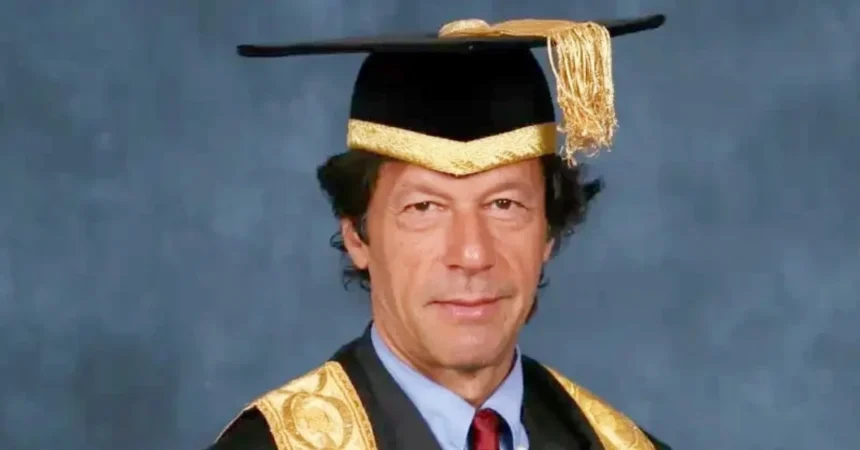Introduction
In a significant development, Oxford University has disqualified Imran Khan, the former Prime Minister of Pakistan, from the race for its chancellorship. This decision has raised questions about the university’s criteria for leadership and the implications of political controversies on academic institutions. As Khan’s political journey continues to unfold, the ramifications of this disqualification are profound, touching on legal, ethical, and diplomatic spheres. This article delves into the details surrounding this decision, exploring the university’s reasoning, Khan’s response, and the broader implications for his future in politics.
Background on Imran Khan
Imran Khan, a cricket legend turned politician, served as the Prime Minister of Pakistan from 2018 until April 2022. His tenure was marked by both fervent support and staunch opposition. Khan’s journey began with the formation of the Pakistan Tehreek-e-Insaf (PTI) party in 1996, with the vision of transforming Pakistan into a welfare state. After years of political struggle, he finally ascended to power in 2018, promising reforms in governance, economy, and foreign relations.
However, Khan’s political career has not been without its challenges. His government faced criticism for its handling of the economy, foreign policy dilemmas, and internal governance issues. In April 2022, he was ousted from office through a no-confidence vote, which he and his supporters claimed was part of a larger conspiracy involving foreign powers and local political adversaries. Since then, Khan has been embroiled in various legal battles, further complicating his public image and political future.
The Chancellor Race at Oxford University
Oxford University, one of the most prestigious educational institutions globally, has a long tradition of appointing chancellors who embody academic excellence and leadership. The chancellor serves as a ceremonial head of the university and represents it in various capacities. This role is significant, and the selection process is typically rigorous.
Imran Khan’s candidacy was notable due to his global recognition and past philanthropic efforts, including the establishment of the Shaukat Khanum Memorial Cancer Hospital & Research Centre and his involvement in various charitable activities. Many saw his potential appointment as a way to bridge the gap between academia and politics, providing a unique perspective on global issues.
Reasons for Disqualification
The decision to disqualify Khan from the chancellor race stems from a combination of legal and ethical concerns. The university cited ongoing legal proceedings against him in Pakistan, which raised questions about his ability to fulfill the responsibilities of the position. Oxford University has a commitment to uphold the highest standards of integrity and public trust, and any candidate embroiled in legal controversies poses a challenge to that commitment.
Moreover, Khan’s political past and the contentious nature of his recent tenure as Prime Minister likely influenced the decision. Academic institutions often strive to maintain a neutral stance in political matters, and a candidate with a polarizing figure in the political landscape can create divisions within the university community.
Imran Khan’s Response
Following the announcement of his disqualification, Imran Khan expressed his disappointment through various social media platforms. He emphasized the need for academic institutions to remain independent and not be swayed by political dynamics. Khan argued that his contributions to education and healthcare in Pakistan should have been considered in the decision-making process.
In his statement, Khan maintained that his legal battles were politically motivated and aimed at undermining his influence in Pakistan. He vowed to continue fighting for his political rights and to uphold the vision he has for Pakistan.
Broader Implications
The disqualification of Imran Khan from the chancellorship at Oxford University extends beyond the immediate political implications for him personally. It raises questions about the intersection of politics and academia, particularly regarding the selection of leaders in educational institutions.
1. Impact on Khan’s Political Career
This decision may further isolate Khan within the political landscape of Pakistan, as it adds to the narrative that he is increasingly viewed with skepticism by international institutions. The fallout from this disqualification could hinder his efforts to regain political ground, especially among his supporters who see him as a champion of change.
2. Reputation of Oxford University
The decision may also impact Oxford’s reputation in Pakistan and among other nations. The university’s stance on Khan could be interpreted as a judgment on Pakistan’s political situation and its leaders, possibly affecting future relationships with Pakistani officials and alumni.
3. Future of Academic Leadership
The case raises important questions about the criteria for selecting leaders in academic institutions. Should political backgrounds be considered? What role do legal matters play in determining a candidate’s suitability? This situation could lead to a reevaluation of the selection processes at universities worldwide.
4. International Perception of Pakistan
Imran Khan’s disqualification at a prestigious institution like Oxford could shape how Pakistan is perceived internationally. The university’s decision might reinforce negative stereotypes about Pakistan’s political stability and governance issues. This perception could have long-term effects on foreign investment and diplomatic relations, as global stakeholders may view the country through the lens of its political controversies.
5. Academic Freedom and Political Influence
The case highlights the delicate balance between academic freedom and political influence. The decision to disqualify a candidate based on ongoing legal issues raises concerns about whether academic institutions are becoming too intertwined with political sentiments. This could lead to a chilling effect on other political figures who wish to engage with academia, fearing they may face similar scrutiny.
6. Influence on Future Candidates
Khan’s situation may discourage other potential candidates from seeking leadership roles in academia, particularly those with a political background. Individuals may hesitate to pursue such positions if they believe their political affiliations could disqualify them from consideration, thus limiting the diversity of perspectives in academic leadership.
7. Implications for Alumni Relations
Oxford University has a vast alumni network that includes influential leaders across various sectors, including politics, business, and academia. The decision to disqualify Khan may strain relations with Pakistani alumni who supported him and may view this decision as a slight against their nation. This could impact fundraising, collaboration, and support from alumni in Pakistan.
8. Reflection on Governance in Educational Institutions
The disqualification raises critical questions about governance in educational institutions. What standards should be set for candidates? Should there be a clear guideline distinguishing acceptable political involvement from disqualifying legal issues? This case may prompt universities to develop more transparent and fair selection processes that can accommodate a range of candidates without compromising their values.
9. Role of Media in Political Disqualifications
The media plays a pivotal role in shaping public opinion about political figures. In Khan’s case, media narratives surrounding his disqualification could further influence public perception and acceptance of such decisions in the future. The way media outlets report on political disqualifications can either strengthen or undermine the legitimacy of the processes involved, ultimately impacting the relationship between academia and politics.
10. Impact on Political Activism within Academia
Khan’s disqualification may deter political activism within academic institutions. If candidates are discouraged from pursuing leadership roles due to their political affiliations, this could stifle important discussions around social justice, governance, and policy within universities. The reluctance of politically active scholars to seek leadership positions may limit the ability of universities to engage meaningfully with societal issues.
11. The Future of Political Figures in Academia
As the boundaries between politics and academia blur, the future of political figures aspiring to academic leadership may be in jeopardy. Khan’s case serves as a cautionary tale for those seeking to bridge the gap between the two fields. Educational institutions may need to consider how to create environments where political figures can contribute to academic discourse without fear of disqualification based on their past or present affiliations.
Imran Khan’s disqualification from the chancellorship at Oxford University marks a pivotal moment in his political journey and raises important questions about the relationship between politics and academia. As he navigates the challenges ahead, both in Pakistan and internationally, the implications of this decision will likely resonate in discussions about governance, integrity, and the role of educational institutions in political matters.
Khan’s future, both as a political figure and as a potential academic leader, remains uncertain. This incident serves as a reminder of the complexities involved in intertwining political legacies with academic aspirations, and it is a reflection of the ever-evolving landscape of global politics.
#ImranKhan #OxfordUniversity #Chancellor #Disqualification #PoliticsAndAcademia #PakistanPolitics #HigherEducation #PoliticalIntegrity







